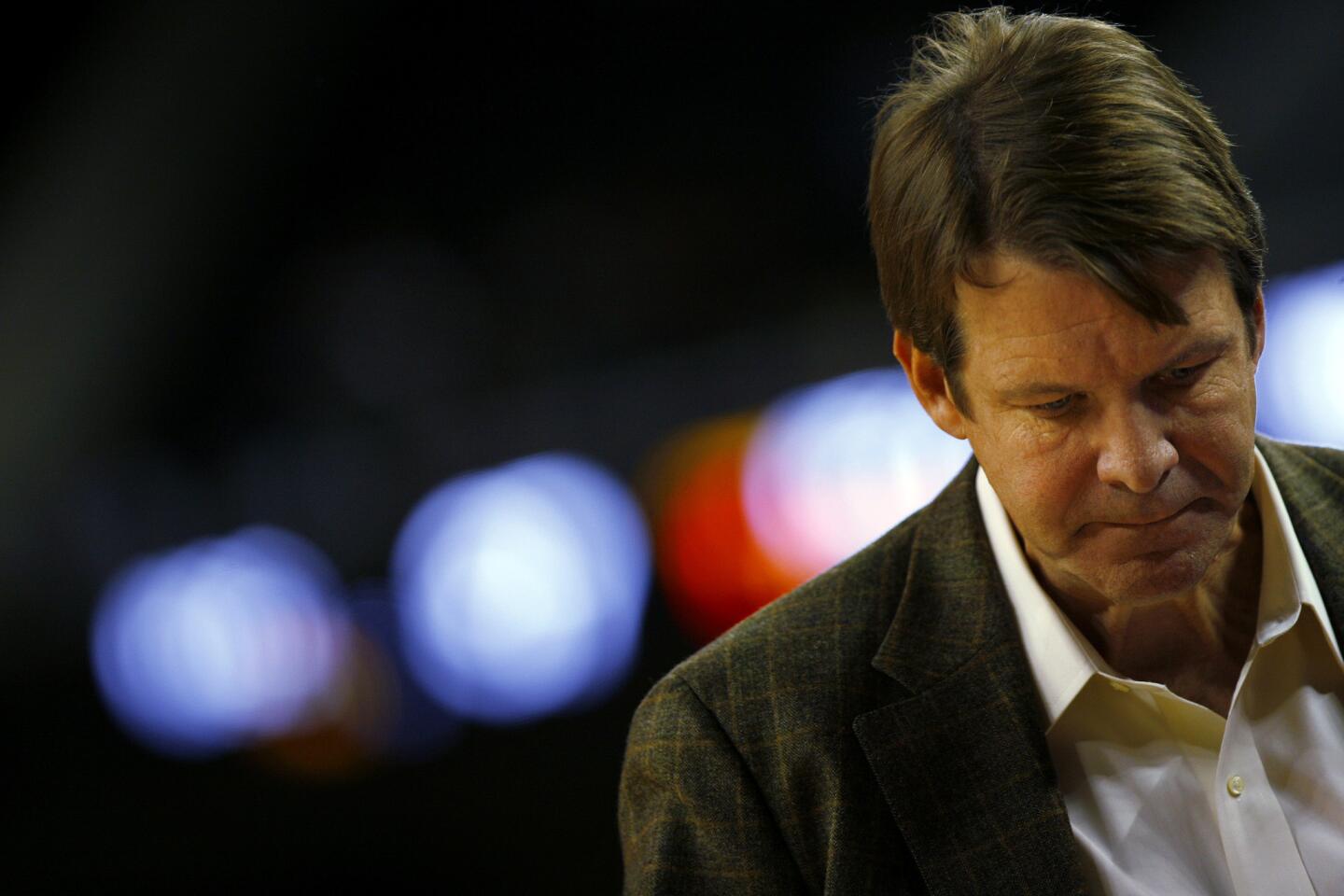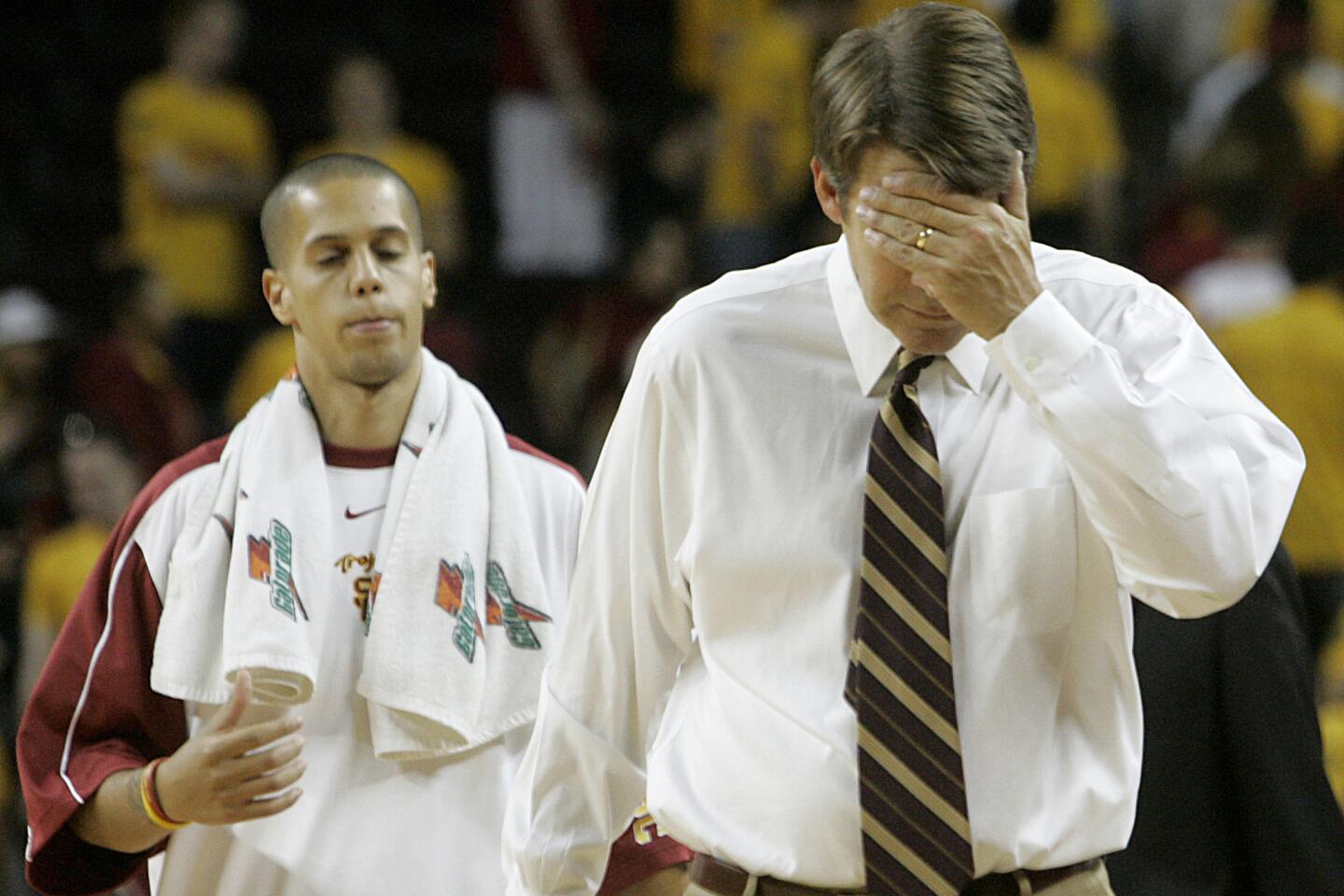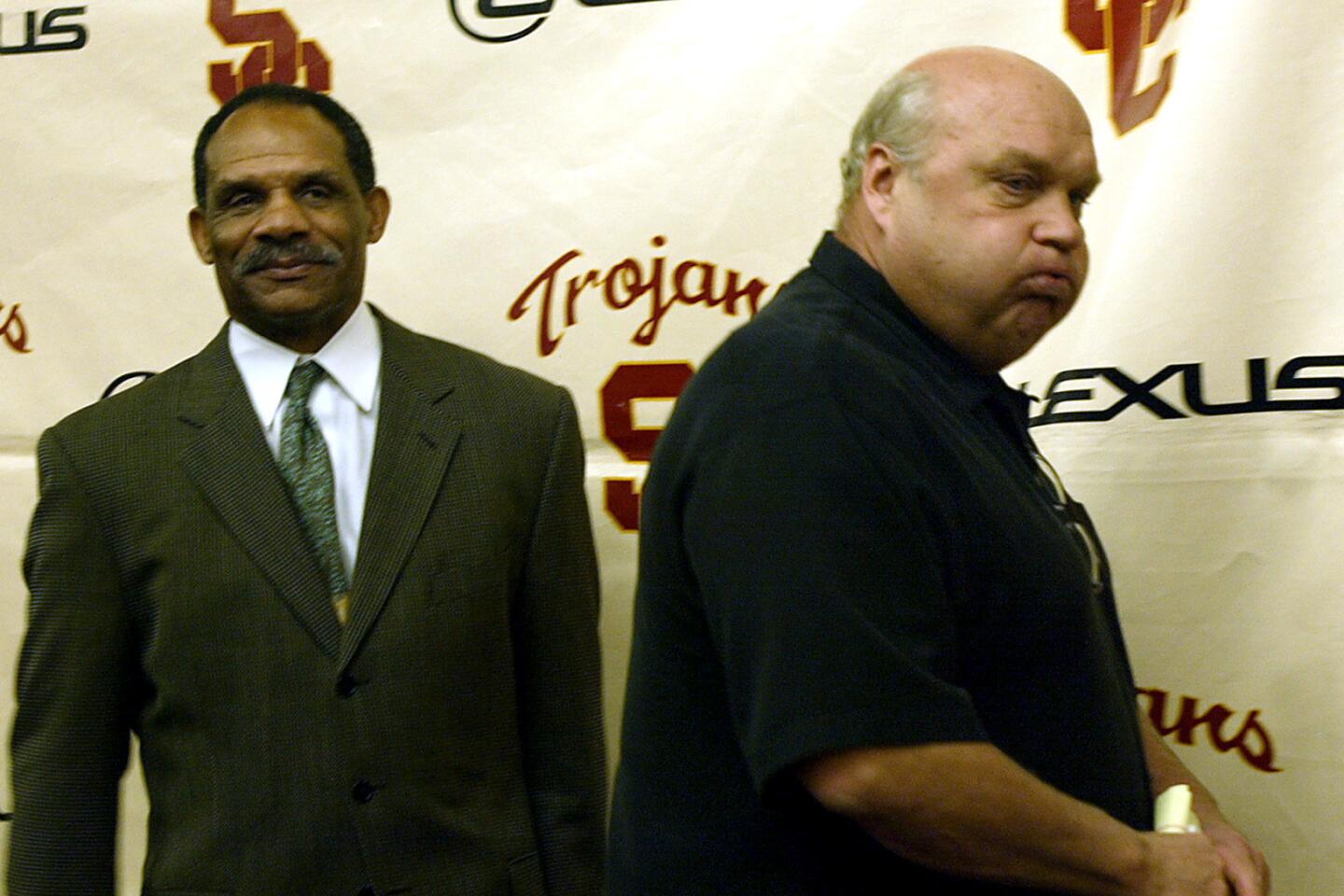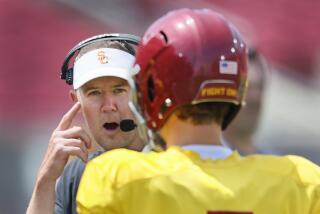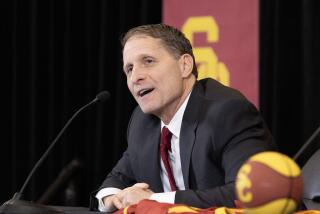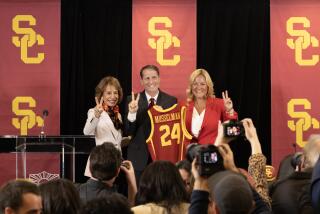Column: Trojans will try again for a new beginning in basketball, starting with the NCAA tournament
It was a loss that gave birth to a dynasty.
Or so thought the poor souls who forgot this was still USC basketball.
It was March of 2001, and the young and athletic Trojans had just come within 10 points of a berth in the Final Four, losing to Duke in the Elite Eight and scoring the ultimate compliment.
See the most-read stories in Sports this hour>>
“They scared the heck out of me,” said Duke Coach Mike Krzyzewski at the time.
Duke eventually won the national championship, while USC floated home to the promise of a new arena, increased exposure, and giant expectations.
“The Trojans were knocked out of the NCAA tournament, but into a place more enduring … into view … Los Angeles sees them now,” I wrote in this column space after that game. “It was not an ending, but a beginning.”
Brian Scalabrine, one of only two starters from that team who were graduating, was so excited he walked onto the court after Duke’s celebration and grabbed a remaining string of net off the rim, eventually framing it with his jersey and locker plaque.
“You think it’s going to last forever,” Scalabrine recalled this week.
It didn’t even last one season.
The following spring, the fourth-seeded Trojans and their legitimate Final Four hopes crashed in the first round during an overtime loss to 13th-seeded North Carolina Wilmington. The winning Seahawks were so anonymous, they didn’t have names on the backs of their jerseys. They were so obscure, during a previous tournament their NCAA charter plane landed in Wilmington, Del.
“Nobody on the team knew much about them, I had never even heard of them,” said the Trojans’ Jerry Dupree at the time. “So we didn’t come to play.”
A postgame quote from Wilmington coach Jerry Wainwright became a mantra for the ensuing 13 years of chaotic, maddening Trojans hoops.
“I don’t know what they were thinking,” said Wainwright. “I knew what we were thinking.”
I don’t know what they were thinking.
As a new group of young and athletic Trojans bring new promise to March with a first-round game Thursday night here against Providence, USC’s frustrating past hangs ominously across the horizon.
These Trojans are fast, but can they outrun their own history?
• Less than three years after the Wilmington meltdown, Henry Bibby was fired as coach just four games into the 2004-05 season after then-athletic director Mike Garrett compared him to a rattling jalopy.
“It’s almost like having a car, you want to turn it in before it breaks down on you,” said Garrett.
• Within 10 days of the Bibby firing, the Trojans used a joyous news conference to announce the hiring of the brilliant former Utah coach Rick Majerus.
“I hope I coach here the rest of my life,” Majerus said.
• Five days later, in a tearful news conference, Majerus quit.
“I made a mistake,” said Majerus, who initially cited health reasons but later admitted he wanted to return to the Midwest to be near his ailing mother.
• Tim Floyd, another accomplished coach, replaced Majerus and led the Trojans to three consecutive NCAA tournament appearances for the first time in school history.
Floyd was in such demand, he fended off several offers from other schools while claiming he was a Trojan for life. More than once, he said, “This is my last job.”
But in June of 2009, he resigned amid allegations he delivered cash to a confidant of star player O.J. Mayo. Floyd denied all charges, and the NCAA later stated he violated no rules, but the Trojans imposed their own set of sanctions that set the program back several years.
• Kevin O’Neill, loud and headstrong, replaced Floyd and coached them through the sanctions and back into the NCAA tournament in 2011.
But O’Neill was suspended after engaging in a verbal altercation with an Arizona booster in a hotel across the street from Staples Center during the Pac-12 tournament, and eventually fired in the middle of the 2012-2013 season.
In one of his final quotes while still a Trojan, O’Neill accused one of his players of “unobliterated immaturity.”
By the time he left, the program was an unobliterated mess.
Even Andy Enfield, who is now being hailed as a potential program savior, went 5-31 in the Pac-12 in his first two seasons. And, oh yeah, during that time, just to bring all this Trojans tumult full circle, Enfield engaged in a heated public argument with — of all people — Texas El Paso Coach Tim Floyd.
“We never wavered as a coaching staff, what our plan was at USC, to build a program with young talented players who want to be at USC,” said Enfield in Wednesday’s news conference here.
They’ve said those words before. They’ve tried that plan before. Can a young roster led by Julian Jacobs and Jordan McLaughlin make it work this week, and then make it stick next season?
The one enduring part of USC basketball has always been the actual players. Through all the storms, the Trojans have produced current NBA players DeMar DeRozan, Taj Gibson, Mayo, Nikola Vucevic and, of course, the swaggy Nick Young.
Whenever those players see Scalabrine before games, they embrace him like a pioneer who once trekked to places that now seem unreachable.
“These are really good players, and they give me so much respect, they’re always like, ‘What’s up, Trojan!’ ” Scalabrine said. “I’m proud of our guys. I’m proud of what USC did for me.”
He is proud, and, beginning Thursday, still hopeful, noting that he has picked the Trojans to advance to the Sweet 16.
When asked why, Scalabrine paused. What he was preparing to say, he knew how it was going to sound, but to love USC basketball is to do so blindly and defiantly, and so he said it anyway.
“Back when I played, I know it didn’t last, I know we just caught lightning in a bottle,” he said. “But looking at this team, I don’t know, why can’t it happen again?”
Follow Bill Plaschke on Twitter @billplaschke
More to Read
Go beyond the scoreboard
Get the latest on L.A.'s teams in the daily Sports Report newsletter.
You may occasionally receive promotional content from the Los Angeles Times.



